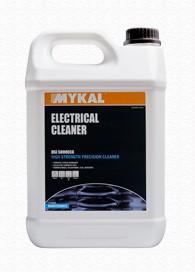Electrical systems and electronic devices are essential in modern life, and maintaining them properly is crucial for efficiency and longevity. Over time, dust, grease, and oxidation can build up on electrical contacts and circuits, leading to poor performance or failures. This is where an electrical cleaner comes into play. Designed to remove contaminants without leaving residue, electrical cleaners ensure optimal conductivity and safety. This guide explores the different types of electrical cleaners, their benefits, and how to choose the right one for your needs.
What is an Electrical Cleaner?
An electrical cleaner is a specially formulated solution used to clean electrical components, such as circuit boards, switches, and connectors. These cleaners evaporate quickly and do not leave behind conductive or corrosive residues, making them safe for use on sensitive electronics.
Why Use an Electrical Cleaner?
1. Enhances Electrical Performance
Dirt and oxidation hinder the flow of electricity, leading to signal loss, malfunctions, and overheating. Electrical cleaners effectively restore proper conductivity.
2. Prevents Short Circuits and Failures
Dust and grease can cause unexpected short circuits. Regular cleaning prevents these issues and reduces the risk of costly repairs or replacements.
3. Prolongs Equipment Lifespan
Corrosion and contamination accelerate wear and tear. Using an electrical cleaner extends the lifespan of your devices and systems.
4. Ensures Safety
Contaminated electrical components can lead to overheating and fire hazards. Keeping them clean helps maintain a safe working environment.
5. Residue-Free Cleaning
Unlike other cleaning agents, electrical cleaners are designed to evaporate completely, leaving no moisture or residue that could compromise performance.
Common Applications of Electrical Cleaners
1. Industrial Machinery
Factories and production plants use electrical cleaners to maintain control panels, relay systems, and automation equipment.
2. Automotive Electronics
Vehicles rely on electronic components that require periodic cleaning to prevent signal loss and malfunctions.
3. Home Electronics
Remote controls, gaming consoles, and televisions benefit from occasional cleaning to remove dust and ensure smooth operation.
4. Computer and IT Equipment
Computers, networking devices, and circuit boards require non-conductive cleaners to maintain efficiency and prevent failures.
5. Power Tools and Electrical Panels
Workshops and electricians use electrical cleaners to ensure proper connections and prevent buildup of dirt and oxidation.
Types of Electrical Cleaners
1. Contact Cleaners
Designed specifically for electrical contacts, these cleaners remove oxidation and restore conductivity.
2. Aerosol Spray Cleaners
Easy-to-use sprays help clean delicate components with precision, making them ideal for hard-to-reach areas.
3. Non-Flammable Electrical Cleaners
Safe for environments where fire hazards are a concern, these cleaners provide efficient cleaning without posing risks.
4. Heavy-Duty Degreasers
Used in industrial settings, these cleaners remove stubborn grease and contaminants from electrical panels and machinery.
How to Use an Electrical Cleaner
Step 1: Power Off Equipment
Before cleaning, always turn off and unplug the device to avoid electrical hazards.
Step 2: Select the Right Cleaner
Choose a cleaner suited to the materials and components you are working with.
Step 3: Apply the Cleaner
Spray or apply the cleaner directly to the affected area, ensuring thorough coverage without oversaturation.
Step 4: Allow it to Dry
Let the cleaner evaporate completely before powering the equipment back on.
Step 5: Inspect and Test
After cleaning, test the component to confirm its functionality and efficiency.
Choosing the Best Electrical Cleaner
1. Residue-Free Formula
For a cleaner that does not leave behind any residue to avoid interference with electrical performance.
2. Material Compatibility
Ensure the cleaner is safe for use on metals, plastics, and other materials in your equipment.
3. Fast Drying Time
A quick-drying formula reduces downtime and allows components to be reassembled and used faster.
4. Safety and Environmental Considerations
Choose a product that complies with safety regulations and is environmentally friendly.
5. Flammability Factor
For high-risk environments, select a non-flammable cleaner to minimize safety hazards.
Conclusion
An electrical cleaner is an indispensable tool for maintaining electrical and electronic systems. Whether you need to clean industrial machinery, automotive electronics, home devices, or IT equipment, choosing the right electrical cleaner ensures improved performance, safety, and longevity.
For high-quality electrical cleaners, explore Enrgtech today. We provide top-tier products to meet your electrical maintenance needs. Shop now for the best deals, fast shipping, and expert assistance!



.jpg)









.jpg)

0 Comments